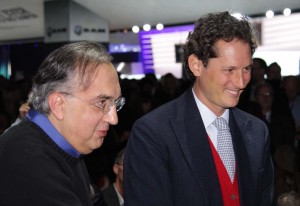
Sergio Marchionne, Fiat Chrysler chairman, and Exor Chairman John Elkan agree that mergers in the auto industry are inevitable.
This story has been updated to include comments from Ford Motor Co.
Fiat Chrysler Automobiles’ dream of initiating a sweeping merger with one of its global rivals isn’t dead.
John Elkann, chairman of Exor, the Agnelli-family investment company that controls FCA, laid out the reasons why mergers were the key to future of the auto industry.
Sergio Marchionne, FCA’s chief executive officer, actually proposed a merger with General Motors last year and laid out the case for consolidation in a presentation dubbed “Confession of Capital Junkie.” GM and its CEO Mary Barra rejected Marchionne’s overture for a friendly merger.
In his letter to Exor shareholders, which was obtained by TheDetroitBureau.com, Elkann said Marchionne’s arguments were still sound and insisted that consolidation in the auto industry was inevitable, given current trends in the industry and in the economy overall.
“Sergio Marchionne was very candid about the structural issues for the car business in his presentation ‘Confession of a Capital Junkie.’ To give you an idea, the total weekly spend of the industry is higher than $2 billion and in the last decade the returns have never met the cost of capital, using proper accounting. And at least 50% goes on features that have no relevance to the customers,” Elkann said.
“There’s no doubt that mergers and integration are hard to do and not all of them are successful. But as Sergio has demonstrated with the creation of FCA, they can work if they are carried out with respect for cultures and in a rational way.”

While Marchionne believes a merger is part of FCA's future, it's unlikely to be with General Motors as Mary Barra has already declined once.
(Fiat Chrysler laying off 1,300 at Michigan plant. For more, Click Here.)
Elkann noted consolidation has been carried out in the beer, pharmaceutical and building material sectors as well as the defense industry where the number of prime contractors for complex weapons systems worldwide has dropped from 16 to six during the past 35 years.
“Some of FCA’s competitors are convinced that they should not engage in doubling down with the past but embrace the disruption of new technologies and embrace business that that address the mobility market, which is twice as big as the one just selling new vehicles.
“This wave of hope reminds me of my early days as a director of Fiat when in 1999 Jacques Nasser was talking about transforming Ford from a boring old car maker whose shares achieve a price earnings ratio of only 10 into a consumer products and service company commanding a multiple of more like 30,” Elkann said in his letter.
Ford’s misadventures with Kwik Fit, which was purchased for 1 billion British pounds and sold for 300 million pounds served to underscore the company’s mistakes. Fiat, Elkann added, made its own mistakes in the 1990s, such as the acquisition of Midas in Europe. Elkann’s references to Ford were enough to cause the automaker to reiterate its intention to remain independent.
“As we consistently have said, Ford has no plan or interest other than to continue to accelerate our One Ford plan, deliver product excellence and drive innovation in every part of our business,” the company said in a statement.
However, Marchionne’s experience running Alusuisse, one of the world’s largest makers of aluminum also “He couldn’t see how the World Wide Web would change the natures of a very capital intensive industry, but he know consolidation would,” Elkann said.
(Click Here for details about which vehicle brands have the best residual values after five years.)
“There’s no doubt that in this decade we’ll see massive change as a result of electrification and other powertrain technologies that are mainly driven by the need to comply with increasing environmental regulation,” he said.
Elkann, however, noted a recent study by McKinsey & Company explained the car industry’s basic strength in the face of disruption by car sharing services and autonomous vehicles as the industry sales grow in the next 15 years from 85 million units to an estimated 115 million units in 2030.
“Even in a high-disruption scenario, shared vehicles will only account for 9% of new vehicle sales, so 90% will be sold to private owners just as they are today,” he said. “Carmakers need to figure out how to make this profitable and guard against falling into the 1990 trap of ignoring that part of the business while chasing profits in other parts of the value chain,” he added.
“Sergio’s common sense back in his aluminum days is still valuable and valid today and has practical approach is to work with new industry participants rather than competing with them.
Elkann also stressed that Exor is in very good shape as the gross value of its assets have steadily increased and FCA itself has grown as the company’s Jeep brand and its components division have had a very good year in 2015 as FCA’s business expanded around the world. FCA revenue increased by 18%, earnings before interest and taxes increased by 40% to 5.3 billion euros.
(To see more Ram boss saying there is room for two in midsize truck line-up, Click Here.)
Exor itself continued to expand by selling off its holdings in the Cushman & Wakefield real estate company, while acquiring General Re, which is a major force in the insurance industry around the world. In addition, Exor also expanded its holdings in Pearson, a British-based publishing company, which owns The Economist, one of the world’s most prominent weekly news magazines.

These guys just don’t get the idea that no one wants to be involved with FIAT. Of course Exor is making money from Jeep,Ram and Dodge Chrysler. If they had to rely on Fiat they would be broke. No one wants to be associated with a company that doesn’t even tell the employees what and where things will be built. It relies on innuendo and the rumor mill. Chrysler is being dumped on again just like with Daimler (a merger of equals). I think not! It was a license to steal and pillage.
Is Fiat still buying carbon credits?
“To give you an idea, the total weekly spend of the industry is higher than $2 billion and in the last decade the returns have never met the cost of capital, using proper accounting. And at least 50% goes on features that have no relevance to the customers,” Elkann said.”
Using proper accounting, uh, ok.
Most of the capital expenses can be held in check by not making last minute changes and program adjustments. It’s an issue of too many cooks in the kitchen, kicking the actual chef(s) out despite that none of these new cooks are capable of boiling hot dog water.
50% of features have no relevance, agreed, as I can’t just get the item I want, I have to buy a “package”, containing five other items I don’t want. And who’s decision was that, why the car manufacturers.
I can never see GM tying up with Fiat again unless Hades does actually freeze over.
Why merge? Let competition take over. Consumer Reports rate products from FCA as worse than average. FCA cars are not competitive and Ford an GM would rather FCA go out of business and take more market share. Maybe Hyundai but I seriously doubt it. With Sergio screaming for mergers I would not buy anything from FCA.